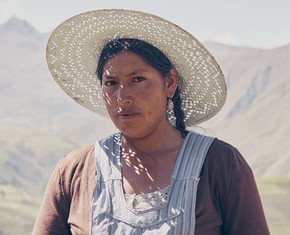The views expressed in our content reflect individual perspectives and do not represent the authoritative views of the Baha'i Faith.
Who out there in the BahaiTeachings.org audience grew up with an inherited religion? Now, of all those people, who currently practices that same Faith?
Not quite as many? Well, if that’s the case you’re definitely part of a trend—the pollsters and social scientists agree, it usually works that way in the modern age.
I fit in that demographic segment pretty well myself. For me, raised as a Lutheran, I began to question my parents’ religion at the age of twelve, and rejected it soon after.
You might be amazed to learn that most people—almost 80% of all adults around the world—grew up within an inherited religious tradition of some kind. The vast majority of the world’s children automatically inherit their familial belief systems, because the parents and grandparents pass it down by training their progeny to believe and behave as they did. The Baha’i teachings say this tradition of blind inheritance has led to hatred and hostility:
… the basic foundation of the religion of God, which was ever the principle of love, unity and the fellowship of humanity, has been forsaken and cast aside, each religious system holding tenaciously to imitations of ancestral forms as the supreme essential. Therefore, hatred and hostility have appeared in the world instead of the divine fruitage of unity and love. By reason of this it has been impossible for the followers of religion to meet together in fellowship and agreement. Even contact and communication have been considered contaminating, and the outcome has been a condition of complete alienation and mutual bigotry. There has been no investigation of the essential underlying basis of reality. One whose father was a Jew invariably proved to be a Jew, a Muslim was born of a Muslim, a Buddhist was a Buddhist because of the faith of his father before him, and so on. In brief, religion was a heritage descending from father to son, ancestry to posterity, without investigation of the fundamental reality; consequently, all religionists were veiled, obscured and at variance. – Abdu’l-Baha, The Promulgation of Universal Peace, p. 443.
Of course, this process of receiving a religious heritage from your parents leaves children, when they grow up, with three basic options for dealing with the religion they were initially taught:
- 1. Fully accept and practice that religion
- 2. Try to practice it, but eventually, for lack of commitment or real belief, drift away or stop
- 3. Reconsider their parents’ religion, and either search for a new Faith or reject religion entirely
The majority of the world’s population still tends toward number 1 or number 2—but recent polls done in dozens of countries around the world have shown a marked increase in the number of people deciding to follow the more independent path described in number 3.
Several current international surveys, including one called “Beliefs about God Across Time and Countries” conducted by the University of Chicago, show that belief in God and adherence to inherited religions has declined over time—and that the process is accelerating.
The Baha’i teachings predicted that trend a century and a half ago:
The vitality of men’s belief in God is dying out in every land; nothing short of His wholesome medicine can ever restore it. The corrosion of ungodliness is eating into the vitals of human society; what else but the Elixir of His potent Revelation can cleanse and revive it? … The Word of God, alone, can claim the distinction of being endowed with the capacity required for so great and far-reaching a change. – Baha’u’llah, Gleanings from the Writings of Baha’u’llah, p. 199.
As you can see from this quote, Baha’is believe that the time for a complete renewal of religion has arrived. The hidebound dogma, the discredited ecclesiastical hierarchies of many ancient faiths, the ascendancy of scientific knowledge, the rise of skepticism and disbelief, the vicious warfare and violence condoned and even encouraged by various so-called “religious” groups—all have combined to convince a growing number of people that religion itself has reached the end of its useful life, and in some cases has actually become harmful.
The Baha’i teachings, once again, agree—but in a different conceptual way:
Baha’u’llah taught that Religion is the chief foundation of Love and Unity and the cause of Oneness. If a religion become the cause of hatred and disharmony, it would be better that it should not exist. To be without such a religion is better than to be with it. – Abdu’l-Baha, Abdu’l-Baha in London, p. 28.
So religion, from the Baha’i perspective, has a life cycle just like any other living organism—it is born, grows, reaches maturity and then declines. When it declines and dies, a new one inevitably rises. If you’re an inheritor of an ancestral religion, the Baha’i teachings say, it’s your privilege and your duty to actually examine it—to independently investigate the truth, and decide for yourself what to believe, rather than letting others decide it for you:
The first [teaching of Baha’u’llah] is the independent investigation of truth; for blind imitation of the past will stunt the mind. But once every soul inquireth into truth, society will be freed from the darkness of continually repeating the past. – Abdu’l-Baha, Selections from the Writings of Abdu’l-Baha, p. 248.
















Comments
Sign in or create an account
Continue with Googleor